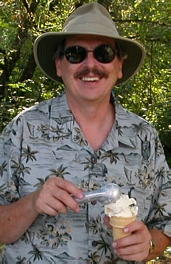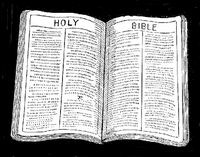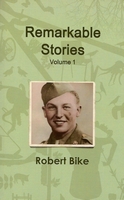
Robert
Bike
Licensed
Massage Therapy #5473
Eugene, Oregon
EFT-CC, EFT-ADV
Teaching Reiki Master
Life Coach
Gift Certificates
|
Reiki
Private classes. |
|
Member
OMTA & ABMP President of the Oregon Massage Therapists Association 2008-2010 & 2012-2013 |
|
I
graduated from Freeport (Illinois) High School. |
|
Please
help keep
this site free. Buy one of my books, on sale below. All sales go to help support this website. |
|
Remarkable
Stories, Remarkable
events have happened in Freeport and Stephenson County, Illinois,
and remarkable people have lived there. These are stories gathered
about people and events from 1835 through World War II. |
|
Biblical
Aromatherapy
by Robert Bike 
The Bible mentions about 232 plants by name, or closely enough to figure out what plant is meant. Of these, 24 are aromatic plants; that is, parts of the plants can be pressed or distilled to get an essential oil. Essential oils are the lifeblood of plants and have tremendous healing capabilities. The
healing power of plants is the basis for modern medicines.
Originally published in manuscript form in 1999, I completely revised the book and added illustrations. To order
Biblical Aromatherapy in paperback, List price $24.99; introductory offer $19.99 To order the pdf version and download to your computer or phone, The electronic version is only $2.99! |
Publicity!
|
Olga
Carlile, columnist for the Freeport (Illinois) Journal Standard,
featured this website in her column on January 19, 2007. |
|
Harriet
Gustason, another columnist for the Freeport Journal Standard,
has featured this website twice. Click to see pdf of articles:
June 29, 2012 November 3, 2012 |
|
"My
Life Purpose is to inspire my friends |
Robert Bike, LMT, LLC
The Class of 1888
Nellie Best, music teacher, Freeport, later married Mr. Scharper, Appleton, Wisconsin.
Edith Devore, attorney, Freeport, later married Mr. Tiffany.
Alma Duth or Deuth, milliner, Freeport, later married Mr. Bucher, Chicago.
Alpheus Goddard, New York, and later manager of the F. R. L. & P. Co., Freeport.
Jennie Huenkemeier, teacher, Madison, Wisconsin, later married Mr. Aylward.
Theresa Kautenberger, teacher, Freeport, later married Mr. Sechrist, Hanford, California.
Anna Kuehner, married Mr. Groneman, Rockford.
Margaret Nieman, Freeport and later Ottumwa, Iowa.
Eva Porter, stenographer, Chicago, later married Mr. Wilcox, Seattle.
Agnes Sage married Mr. Piersol, Freeport and later Danville.
Waldo S. Snyder, Riverside, Illinois and later Roswell, New Mexico.
Jennie Upp, married Mr. Poling, Freeport and later Chicago.
Arthur Fischer Bentley, a philosopher who published books about his philosophical views of group interaction in the political process, was born in Freeport, Illinois, on October 16, 1870, and went through school with the Freeport High School Class of 1888. Near his graduation, his parents moved to Grand Island, Nebraska, and he may have graduated there.
He entered York College, in Nebraska, but soon transferred to the University of Denver. At the age of 20, Bentley entered Johns Hopkins University, where he studied Economics under Dr. Richard T. Ely. He completed his undergraduate program in two years and earned an A.B. in 1892. The next three years were in graduate work in Sociology, the 1st & 3rd at Johns Hopkins, and the second at the University of Berlin and the University of Freiburg im Breisgau. He earned his Ph.D. in 1895, presenting the thesis, The Units of Investigation in the Social Sciences, stressing the human mind as a central point for all study of social phenomena.
Bentley served for a year (1895-1896) as an instructor in Sociology at the University of Chicago. During his brief teaching career, he met Dr. John Dewey, and the two later collaborated on a book and several articles.
He gave up his teaching career in 1896, and worked as a reporter and editorial writer for the Chicago Times-Herald and the Record-Herald for the next fifteen years.
It was during this period that he wrote The Process of Government (1908). He was influenced by the corrupt political environment in the Chicago City Council.
Much like politics everywhere today, any discernible intellectualism was overwhelmed by conflicting interest groups.
In The Process of Government, Bentley attacked the causes of the behavior of government officers. He characterized government as a process in which interest groups are the protagonists.
Under this framework, interest groups are a certain portion of members of a society taken as a mass activity, and does not preclude anyone who participates in it from participating in other groups. Every person has not one but many interests; and the more complex their culture becomes the more interests they have.
In these terms a group and its activity are equivalent. For Bentley, there is no group without a specific interest. Such specific interest identifies a certain group. As the shared interest that defines a group declines, the group itself becomes weak and may disappear.
Interest groups are the raw material of understanding government behavior. The process of government is the activity of the groups in their relation with one another; no group has any meaning except in its relation to other groups. Groups are in constant activity, pressing one another, cooperating, competing, forming offensive and defensive alliances, splitting apart, and disappearing, while new groups are constantly being formed. Strong groups dominate, and delineate the existing state of society.
The Process of Government was almost ignored by political scientists for two decades. Then it was re-discovered. By the fifties, empirical studies of the role of pressure groups in the legislative, judicial, and administrative processes and in molding public opinion had become a major preoccupation of political scientists.
Since the early 1970s some economists, members of the so-called Chicago Political Economy School, have followed Bentley's insights, beginning the challenging work of building a general theory able to provide conditions that favor the existence of successful interest groups and explanations of the tactics of the parties to the different regulatory policies.
Bentley's theories are now considered the seminal work in this field. What interested me most as I was studying Bentley's writings as a Freeport High School graduate, was that his theories fit all forms of government. We tend to think in terms of our own form, and the corruption that we see; but Bentley's theories also fit totalitarian forms, dictatorships, communism, liberals, conservatives, libertarians, constitutions, electoral, republics, democrats, military coup d'etats; indeed all forms of government (and all the people who live in them) fall under these theories.
"The electorate never includes the whole citizenship. Always the minors are excluded, and usually all of the women. The criminal and insane elements of the population are excluded, and in most large modern states also some portion of the other adult males who cannot conform to fixed property or educational qualifications. In the United States property qualifications exist in some states, while on the other hand in many states they have been entirely abandoned, and indeed the electorate has been broadened to include males who are not, by legal definition, citizens. All of these tests and qualifications are themselves the direct result of group pressures." - Arthur Bentley, The Process of Government 1908, p. 425
Bentley also believed that politics stemmed from economic issues.
"If I may be pardoned a remark from my own experience, I will say that my interest in politics is not primary, but derived from my interest in the economic life; and that I hope from this point of approach ultimately to gain a better understanding of the economic life that I have succeeded in gaining hitherto." - Arthur Bentley, The Process of Government 1908, p. 210
Bentley could have been writing about the George W. Bush administration's struggle with ethics (or lack thereof): "Suppose, for example, we take a modern battle, and note that it is fought, not with complete abandon, but under definite limitations which forbid certain cruelties, such as the poisoning of springs, the butchery of the wounded, firing upon Red Cross parties, the use of explosive bullets, or the use of balloon explosives. Or suppose we take a political campaign, and note that in one country the contestants use methods which are not used in another. There are rules of the game in existence, which form the background of the group activity. There is no savage tribe so low but that it has rules of the game, which are respected and enforced." Arthur Bentley, The Process of Government 1908, p. 218
This passage from Freeport's philosopher Bentley speaks of our spirit: "A man is kind, or violent, or careless, or smooth, or stupid, or dishonest, or tricky, or insincere, or clever, or trustworthy; or, more generally, good or bad, wise or foolish. These are his qualities. They designate him. They are put forth not merely as habits of action, labeled by us, but as his very personality. All this is the current life of one man, judging the others around him. Out of material of this kind we have built up many theories of the causes of man's activities in society... We find that if we are going to use this soul-stuff to explain social activities we must be able to show either qualitative changes in it, or quantitative increase of some forms of it, or our explanation will come to nothing. What is more, we must show this in some other way than by mere inference from the facts we propose to explain. If we are going to infer a soul quality from the social fact and then use the quality to explain the fact, we put ourselves on a level with animists in the most savages tribes. A branch falls. It was the life in it or behind it that threw it down. Thunder peals. It is a spirit speaking. The grain grows. It is the spirit of the corn pushing it up. The man is a slave. It is because such is his nature... We pass child labor laws. It is because we will not tolerate abuses our fathers tolerated. That man is a boss at the head of a corrupt machine. It is because he is dishonest by nature. This man wrote a great book. It is because he had a giant intellect. The stick, the storm, the crop need no spooks to explain them. The child labor laws, the sparing of animal life, the corrupt politics, and even the great book will not be explained while such spooks interfere." - Arthur Bentley, The Process of Government 1908, pp. 5, 19
He was also the author of Relativity in Man and Society (1926) , Knowing and the Known (1949 with John Dewey), and Makers, Users, and Masters (1969, posthumously). His controversial, often critical views of American government prevented his acceptance by mainstream academia, though I like his writings rather well!
Bentley
died in 1957.
Most of this information was taken from “The New Economics of Human
Behavior" by Mariano Tommasi and Kathryn Ierulli (eds.), Cambridge
University Press,1995. www.cema.edu.ar/~eez/Publicaciones/CapitulosdeLibros/The_Process_of_Government.PDF

